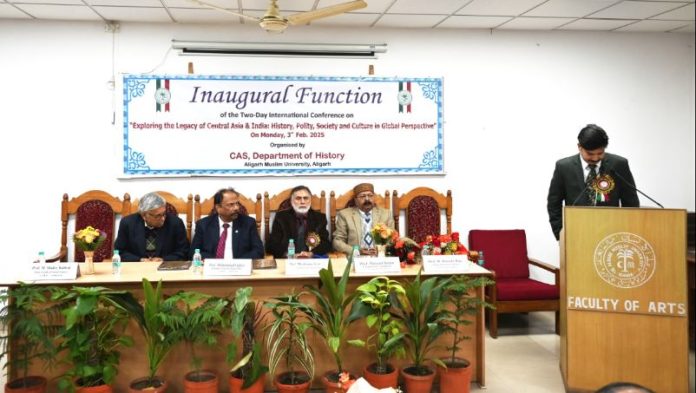Aligarh: Eminent scholars, historians, and academicians from various institutions discussed the deep-rooted historical, cultural, and political connections between Central Asia and India, in the international Conference on “Legacy of Central Asia & India: History, Polity, Society, and Culture in Global Perspectives”, organised by the Centre of Advanced Study, Department of History, Aligarh Muslim University (AMU).
Professor Hassan Imam, Chairperson and Coordinator, CAS, Department of History, delivered the welcome address. He provided a historical overview of the early interactions between Central Asia and India. He highlighted the significance of the Silk Route as a medium of cultural and economic exchange and emphasised that Indian culture is a synthesis of Eastern and Western influences.
Professor M. Waseem Raja, convener of the conference introduced the central theme of the seminar, pointing out that the theory of Mughal kingship cannot be comprehended without examining Mongolian and Timurid ideals. Looking at contemporary times, he stressed the need for a collaborative approach to bridge the historical and modern relations between Central and South Asia. He recited thought-provoking couplets of Allama Iqbal and emphasised the indispensable role of Central Asia in understanding Indian history.
Prof Raja concluded his address by referencing Alberuni, the 12th-century historian who played a pivotal role in connecting the two regions through his extensive writings.
Professor Mohammad Gulrez, former Vice-Chancellor of AMU, brought his expertise in West Asian studies to the discussion. He remarked that the conference was highly relevant, given the contemporary geopolitical landscape.
Prof Gulrez drew connections between modern West Asia and Central Asia, highlighting the increasing involvement of global powers such as the USA, Russia, Türkiye, China, and India in the region. He spoke about India’s dependence on Central Asian countries for fossil fuels, uranium, and minerals. He provided insights into the historical “Great Game” and its modern manifestation, the “New Great Game,” while discussing China’s One Belt One Road (OBOR) policy. The significance of India’s connection with the Chabahar Port in Iran was also highlighted, underscoring its strategic importance in strengthening India’s presence in Central Asia.
Professor Mushtaque Kaw, a retired scholar from the University of Kashmir, delivered the keynote address. A widely published and internationally recognised expert on Central Asia, he began by reminiscing about his time at Aligarh and expressing gratitude to the organisers. His address encompassed various dimensions of Central Asia’s legacy, including its ethnically diverse tribes and dynasties.
Prof. Kaw emphasised that Central Asia has historically produced prominent figures such as Bahauddin Naqshbandi, Al-Farabi, Ibn Sina, Babur, and Timur. He described the region as a vital trade corridor connecting China and Rome, underscoring its historical role in global commerce.
Moving to contemporary issues, he discussed the political landscape of the five Central Asian republics – Kazakhstan, Kyrgyzstan, Tajikistan, Turkmenistan, and Uzbekistan – while addressing the intricate relationship between their local cultures and Sunni Islam.
Building on Prof. Gulrez’s comments, Prof. Kaw elaborated on the economic aspects of Central Asia, particularly the significance of highway trade. He reinforced the importance of the Chabahar Port and the need to revive the Silk Route for economic and cultural diplomacy.
He also pointed out the security threats faced by Central Asian republics due to geopolitical, geo-economic, and geo-strategic challenges. Concluding his address, he suggested alternative routes for India to establish direct connectivity with Central Asia, bypassing Pakistan.
Professor Shafey Kidwai, Dean, Faculty of Social Sciences, provided a thought-provoking perspective on the relevance of history in shaping the future. He remarked that while individuals can be benefactors of great cultural traditions, they should remain wary of its narrow interpretations. Emphasising multiculturalism and multilingualism, he quoted Mahatma Gandhi, stating that culture resides in the heart and soul of a people. He also referenced the recent work of historian Ayesha Jalal on similar themes.
Prof. Kidwai stressed that culture should not be wielded as a tool to undermine others but rather as a means of fostering inclusivity and understanding. Dr. Sana Aziz from the CAS, Department of History, delivered the vote of thanks.




